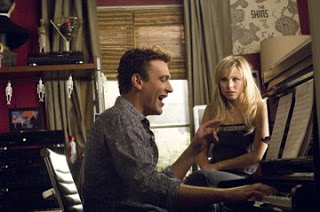 “Forgetting Sarah Marshall” jogged audience’s memory of what an R rated sex comedy is like April 18th. Adding to the his already Apatow laden mantle, George H. Anderson supervised sound editorial. Anderson ends his summer in a puff of smoke with August’s “Pineapple Express”. Mixing took place at Todd-AO’s Santa Monica facility with Adam Jenkins and Orest Sushko. The team adds to the coming of age through the art of dance genre with August’s, “Make it Happen”. Production sound on “Marshall” was handled by Richard Van Dyke whose next film is Ridley Scott’s October releasing drama, “Body of Lies”. Songwriter Lyle Workmen lent his talents to “Marshall”. Another Apatow alum, Workmen composed for “The 40-year Old Virgin”and “Superbad”.
“Forgetting Sarah Marshall” jogged audience’s memory of what an R rated sex comedy is like April 18th. Adding to the his already Apatow laden mantle, George H. Anderson supervised sound editorial. Anderson ends his summer in a puff of smoke with August’s “Pineapple Express”. Mixing took place at Todd-AO’s Santa Monica facility with Adam Jenkins and Orest Sushko. The team adds to the coming of age through the art of dance genre with August’s, “Make it Happen”. Production sound on “Marshall” was handled by Richard Van Dyke whose next film is Ridley Scott’s October releasing drama, “Body of Lies”. Songwriter Lyle Workmen lent his talents to “Marshall”. Another Apatow alum, Workmen composed for “The 40-year Old Virgin”and “Superbad”.
Ah the elusive music dept. I finally nabbed some time from one of these fine individuals to shed some light some post sound I know the less about. Thanks so much to music editor and supervisor Jonathan Karp for taking time out of his schedule for this Q and A!
DS: First off, out of sheer ignorance, explain the role of a music editor?
JK: A music editor performs various tasks which include cutting temp music, taking and updating spotting notes (lists of all the cues and timings of the cues as they appear in the picture), preparing cue timing notes for the composer, performing click and other duties at scoring sessions, all while continually conforming the music through numerous picture changes. The music editor is the individual responsible for preparing and delivering the music throughout the mixing process.
DS: How did music editing in your career evolve with taking on the supervision role too? Does it change your dynamic with composers?
JK: It evolved naturally. I’ve been fortunate to have been involved creatively as well as technically in the majority of projects that I’ve worked on. Through increased involvement in the business and creative areas of the music, I’m able to have a clear idea of exactly what needs to be done to achieve a goal. It probably does change the dynamic with composers, but each film is so different with different collaborators, that it’s never the same each time out anyway.
DS: What thematic role did the filmmakers on “Forgetting Sarah Marshall” want out the music dept?
JK: At the beginning of the music process, the main focus was the production of the various songs that Russell Brand and Jason Segel sing in the movie, hiring a Luau band and preparing those recordings, and last but not least, production of ‘A Taste For Love,’ the Dracula musical that appears in the film. The tone of the movie was clear from Jason Segel’s script and table reads, so there was never much discussion about that aspect of our approach.
DS: You’ve worked with Apatow for a while now. How has your working dynamic with him changed since “Freaks and Geeks”?
JK: Well, having collaborated on a good number of films at this point, we sort of have a shorthand together in our working methods. We also tend to be on the same page in our view of what the music should be like for each particular picture.
DS: With music featured so prominently in his films as well, what is it like to work with PT Anderson?
JK: Paul knows what he wants and when he has found it. Being a part of the teams that helped him put together the music for “Magnolia” and “Punch Drunk Love” was full of amazing experiences.
DS: You started out in sound effects editorial, what prompted you to transition to the music dept?
JK: Music has always been my strongest interest and I quickly moved towards that aspect of post production after a short learning process as a sound effects editor. Sound effects editing proved to be a good way to get a handle on the technicalities of preparing sound for a feature film, and getting my start in the business.
DS: What was your first gig like?
JK: My first film experience was as a sound effects editor on the Ice Cube movie, “Friday”. It was a great learning experience and lots of fun, as the whole principal cast was around frequently. My main role was to cut all the background sound in the movie. For a laugh, go back and listen for the crow that follows Tiny Lister’s character, Debo around. In addition, I was able to witness and participate in a great number of the aspects of preparing a theatrical sound mix, which was invaluable.